
Why Is Philosophy Important Today, and How Can It Improve Your Life?
From clarity to tolerance: here’s your quick guide to why philosophy is important today, as well as how it can improve your life.
Philosophy essentially involves thinking hard about life’s big questions, including — as we discuss in our article on what philosophy is, how it works, as well as its four core branches — why we are here, how we can know anything about the world, and what our lives are for.
Here at Philosophy Break, we believe the practice of philosophy is the antidote to a world saturated by information, and the more that people engage with philosophy, the more fulfilling their lives will be.
The addictive nature of the digital world, for instance, afflicts many of us. The relentless torrent of information saturates our attention spans. But life is finite, and the things we give attention to define our lives. It’s crucial to break free from the turbulent current and come up for air.
As Roman Stoic philosopher Seneca put it almost 2,000 years ago in his brilliant treatise, On the Shortness of Life:
It is not that we have a short time to live, but that we waste a lot of it. Life is long enough, and a sufficiently generous amount has been given to us for the highest achievements if it were all well invested. But when it is wasted in heedless luxury and spent on no good activity, we are forced at last by death’s final constraint to realize that it has passed away before we knew it was passing. So it is: we are not given a short life but we make it short, and we are not ill-supplied but wasteful of it… Life is long if you know how to use it.
Streaming services hook us into one more episode, those of us with smartphones check them without thinking; but the compulsion to watch, to shop, to hit refresh on our newsfeeds — all of it can be reined in by contemplating the world around us, and our place within it.
How can we best spend our lives on earth? What makes you happy? What gives you purpose?
A lot of the anxieties and uncertainties we feel in our lives, from wondering if our occupations give us the meaning we need, to not being able to come to terms with death, are at root philosophical problems. And philosophers have confronted and had hugely insightful things to say about these problems for thousands of years.
Critically engaging with the enduring wisdom of philosophy is a fantastic way to both inform ourselves about the problems inherent within the human condition, and also face up to those problems and calm our existential fears and anxieties.
By engaging with the ideas of great thinkers throughout history, we’re empowered to think for ourselves — be it on matters of meaning and existence, how to make a better world, or simply working out what’s worth pursuing in life.
For as Socrates, the famous ancient Greek martyr of philosophy, declared:
The unexamined life is not worth living.
Philosophical contemplation is the starting gun that jolts us out of going through life as if we’re only going through the motions, living only according to the expectations of others, or living by norms we’ve never really thought about, let alone endorsed.
Philosophy opens our eyes to the multitudinous ways we can spend our lives, engendering tolerance for those whose practices differ from our own, and reawakening a childlike wonder and appreciation for the sheer mystery and opportunity lying at the heart of existence.
Why is philosophy important today?
Philosophy is sometimes considered outdated — a perception not helped by the subject’s apparent obsession with reaching back over thousands of years to consider the works of ancient figures like Socrates, Plato, Aristotle, and Confucius.
But the point of philosophy in modern times remains the point philosophy has always had: to answer the fundamental questions that lie at the heart of the human condition.
Philosophy plays a crucial role in this regard not just in personal study and exploration, but formally in academia and modern research projects. And, even as time mercilessly advances, it turns out ancient figures whose works have survived over millennia still have some of the most interesting things to say about our human predicament, making their wisdom worth republishing and studying generation after generation.

Now, it might be thought that some of the questions philosophy touches on, such as the basic nature of the universe, or the emergence of consciousness, have been superseded by more specialist scientific subjects.
For example, physicists are at the forefront of investigating the fundamental nature of reality. Likewise, neuroscientists are leading the way in unlocking the secrets of the brain.
But philosophy is not here to compete with these brilliant, fascinating research projects, but to supplement, clarify, and even unify them.
For instance, when physicists share their latest mathematical models that predict the behavior of matter, philosophers ask, “okay, so what does this behavior tell us about the intrinsic nature of matter itself? What is matter? Is it physical, is it a manifestation of consciousness? — and why does any of this stuff exist in the first place?”
Equally, when neuroscientists make progress in mapping the brain, philosophers are on hand to digest the consequences the latest research has for our conceptions of consciousness and free will.
And, just as pertinently, while computer scientists continue to advance the sophistication of AI, philosophers discuss the implications an ever-growing machine intelligence has for society, and dissect the urgent ethical and moral concerns accompanying them.
With its focus on argument and clarity, philosophy is particularly good at rooting out the assumptions and contradictions that lie at the core of commonsensical thinking, sharpening our insight into truth, and lending security to the foundations of knowledge in all areas of research — especially the sciences, operating as they do at the frontiers of what we know.
The Sleep of Reason Produces Monsters
The practice of philosophical reflection is not just important for progressing research, however: it is crucial for successfully navigating a world in which competing responsibilities, information, and forces pull us in various directions.
This is exactly what the Spanish painter and printmaker Francisco Goya understood when he produced his famous etching, The Sleep of Reason Produces Monsters, depicted below.

In his analysis of Goya’s etching, contemporary philosopher Simon Blackburn notes in his book Think that “there are always people telling us what we want, how they will provide it, and what we should believe”, forcefully continuing:
Convictions are infectious, and people can make others convinced of almost anything. We are typically ready to believe that our ways, our beliefs, our religions, our politics are better than theirs, or that our God-given rights trump theirs or that our interests require defensive or pre-emptive strikes against them. In the end, it is ideas for which people kill each other. It is because of ideas about what the others are like, or who we are, or what our interests or rights require, that we go to war, or oppress others with a good conscience, or even sometimes acquiesce in our own oppression by others.
With so much at stake, sleeps of reason must be countered to stop the dangerous spread of misinformation. Blackburn recommends philosophical awakening as the antidote:
Reflection enables us to step back, to see our perspective on a situation as perhaps distorted or blind, at the very least to see if there is argument for preferring our ways, or whether it is just subjective.
By deploying critical thinking and the rigor of philosophy, we are less likely to be duped or led by those who — intentionally or unintentionally — malform our thinking.
Blackburn’s advocacy for critical philosophical reflection can be paired with the full motto of Goya’s etching:
Imagination abandoned by reason produces impossible monsters: united with her, she is the mother of the arts and the source of her wonders.
Philosophy’s transformative power
Beyond the clarification of knowledge, the greatest philosophy — like the greatest science — has enormous explanatory power that can transform how we see the world.
Just as Albert Einstein’s theory of relativity skewers our everyday notion of time, so Friedrich Nietzsche’s dissection of morality challenges our everyday notions of ‘good’ and ‘evil’, John Locke’s analysis of color challenges our very idea of whether perception is reality, and Lucretius’s timeless reflection on death helps us cope with our mortality.

The world is uncertain, and the value of philosophy lies precisely in facing up to this uncertainty — and in finding footholds for knowledge and progress in spite of it. As the 20th-century philosophical giant Bertrand Russell summarizes in his wonderful exposition on why philosophy matters:
Philosophy is to be studied, not for the sake of any definite answers to its questions since no definite answers can, as a rule, be known to be true, but rather for the sake of the questions themselves; because these questions enlarge our conception of what is possible, enrich our intellectual imagination and diminish the dogmatic assurance which closes the mind against speculation; but above all because, through the greatness of the universe which philosophy contemplates, the mind also is rendered great, and becomes capable of that union with the universe which constitutes its highest good.
Discover philosophy’s greatest wisdom
If you’re interested in learning more about philosophy, our celebrated introductory philosophy course, Life’s Big Questions, distills philosophy’s best answers to some of life’s most troubling questions, taking you on a whirlwind five-day journey of reflection, understanding, and discovery. Here are the questions covered:
Why does anything exist? Is the world around us ‘real’? What makes us conscious? Do we have free will? How should we approach life?
Enroll today, and each day over five days, you’ll receive beautifully-packaged materials that distill philosophy’s best answers to these questions from the last few millennia. Interested in learning more? Explore the course now.
By choosing to learn more about philosophy, a wonderful journey of self-discovery awaits you... have fun exploring!
Life’s Big Questions: Your Concise Guide to Philosophy’s Most Important Wisdom

Why does anything exist? Do we have free will? How should we approach life? Discover the great philosophers’ best answers to life’s big questions.
★★★★★ (100+ reviews for our courses)

Latest Course Reviews:
★★★★★ Wonderful
Wonderful! So clear and inviting to use. Just the right level of challenge. Felt like I was really learning. My favorite chapter was the one on Consciousness - what is it? I wonder about this all the time. Thank you for doing this, Jack. Your work is such a gift.VERIFIED BUYER
Mary T. on 8 July 2025★★★★★ Clear and concise
Fun and enjoyable. Clear and concise. Easy to navigate. Easy to get involved in discussion. Free will was my favorite chapter. Very relevant subject for which philosophy has a great deal to contribute.VERIFIED BUYER
Roger M. on 7 July 2025★★★★★ Really enjoyed
Just completed Life's Big Questions, which I really enjoyed reading. Thank you so much for putting it together. It really improved my understanding of so many points, particularly the chapters on Is Life real and free will.VERIFIED BUYER
Asad B. on 22 March 2025